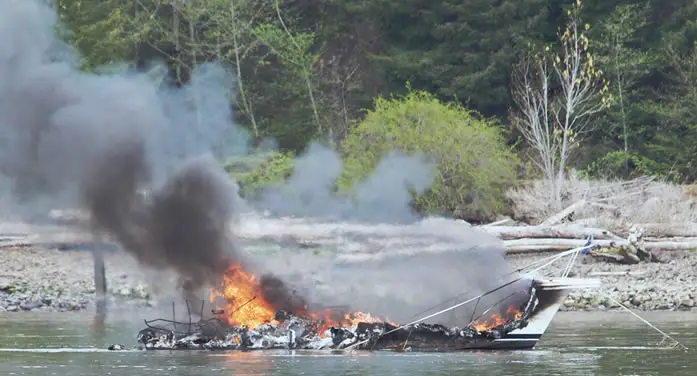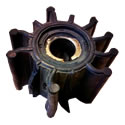Yamaha Outboard Continuous Beep Error Codes
Anytime that your boat starts to beep, you need to listen. A beeping sound is an indication that there is something wrong and, this is your boats way of trying to warn you.
A beeping sound could be coming from a boat for several different reasons, but the most common is because of a fuel restriction brought on from a clogged filter. A clogged filter will slow the flow of gas from feeding into the motor quickly enough. You might notice that while you are holding the throttle down, this is when you hear the beeping noise.
If you ignore a beeping sound coming from your boat, you could cause some serious damage to the engine.
As mentioned, a boat could beep for several reasons, and there are also different types of beeps depending on the problem. For example, you could hear a few beeps every 2 minutes, or you could hear one long continuous beep. Your owner's manual should be able to tell you what each beep means so you can help determine what is wrong.
Some Reasons Why Your Boat Might be Beeping
When I was first onboard a boat that began to beep, I had no idea what was happening, or that there were so many different reasons why a boat would beep in the first place. After doing some research on the topic, I was able to put this list together that might help give you a better idea why your boat is beeping.
- Low voltage – The alternator could be spinning slowly.
- Oil low indicator – Check your oil reservoir levels and make sure they are topped up. If they are topped up, while the beeping is going on you can try removing the blue wire from the oil reservoir cap. Now if this stops the beeping, then the problem could either be that the oil level sensor is bad or the level of oil is too low. If that doesn't stop the beeping, then put the blue wire back into the oil reservoir cap and try something else.
- Oil pressure – This could mean a few things. Either the sensor could be bad, the oil pump could be not working correctly, you could have metal fragments in the oil causing blockage, bad head gasket, or a rear cam bearing has spun in the block and could be partially blocking the main oil passage.
- Clogged filter – Check your filters and make sure they are clean. A clogged fuel filter could restrict the amount of fuel passing through them.
- Bad wiring/loose wire – You could have a frayed wire or cut wire. If you can't find any other reason for the beeping and everything looks good, it could be a loose wire. Try pulling a little on the wiring going into everything to make sure the wires are all secure. Don't pull too hard, just enough to know if it is secure.
- Overheating – The reason your boat engine might be overheating could be because there is not enough water flow due to a clog or blockage of some sort. Check and make sure that nothing is clogging the holes. You can try taking a paperclip and poking it inside the pee hole to see if this helps unclog that.
If the problem is not due to a clogged hole, then it could be because the impeller is worn out or damaged and is not drawing enough water in to cool off the motor. - Depth finder – Perhaps yours is stuck and making the beeping noise that you can hear.
- A faulty idle air control valve (IACV) – If this valve fails or has any problems with it, then this could cause the idle speed to be thrown off. When this happens, the idle speed could either idle high or low.
- Throttle position sensor – Just like in the name, the throttle position sensor is used to monitor the throttle position. If this is broken or dirty, then it could be giving a false reading and not detecting the proper position of the throttle.
- Sonar – The beeping noise you are hearing might be coming from the sonar that you accidentally left turned on.
- Faulty alarm – Perhaps the alarm itself is the problem. Check the wires and make sure they are secure and not damaged.
- Damaged thermostat – If the thermostat is damaged, then this will cause the engine to overheat.
- Engine belt – The engine belt that drives the water pump could be worn or broken.
If you can't find the problem, then you can try taking the motor into a dealer or mechanic and have them plug it into a diagnostic checker to dig deeper into the issue.
Check your owner's manual and see what they say about the different types of alarms and what the causes could be.
What to Do if Your Boat Starts Beeping
If your boat starts to beep, the first thing you should do is NOT ignore it. There is a reason why the boat is beeping, and you should figure out what the problem is. You can get lucky, and it could just turn out to be a faulty wire or connection, but it could also be something much more severe than that, like an overheating engine.
To get rid of an alarm, you can try turning off the motor which should stop the beeping noise. Sometimes turning off the motor and turning it back on will get rid of the beeping. Restarting the engine should be a short-term fix, and it won't correct the real reason why your boat began beeping in the first place.
What Are Signs That my Boat Engine is Overheating
There are a few signs that could indicate your engine is overheating. Here is a list of initial problems below that could indicate if your engine is overheating. If you notice any of these happening, then don't just ignore them.
- Your temperature dash gauge will go from green and into the red.
- If you shut off your engine and it won't start back up right away, this could be because the engine has overheated and it'll not start up again until it has cooled down.
- You also might notice that your engine is losing power.
- A lot of steam coming from the exhaust could also be an indication that your engine is starting to overheat.
- And of course, you might also hear the constant warning beeping telling you that there is something wrong.
What to Do if Your Boat Engine Overheats
If your boat engine starts to overheat, you should let back on the throttle and stop your boat. If you continue to drive your boat while the engine is overheating, then you can risk causing severe problems, like a blown cylinder head gasket, or a complete seizure of the engine.
The best thing you can do for your engine is to help cool it down. If this means stopping for a half-hour to an hour to sit and enjoy the time out on the water, then that is what you should do. It might be a good excuse to sit and fish or take a nice long swim.
Research has shown that almost 10 percent of all boat fires have been caused by engines that have overheated.

What To Do If Your Boat Is Overheating

The beeping alarm could be caused by a worn-out or damaged water pump impeller. Inboard and sterndrive engines usually have a raw water pump that is designed to cool the system and prevent overheating. If the impeller is broken it won't be able to do its job properly.
Marine mechanics recommend that you check and inspect the water pump impeller every 100 to 200 hours, and change the impeller every 1 to 2 years as preventative maintenance. It's also a good idea to carry a spare impeller with you just in case becasue when the impeller breaks, it's normally at the most inconvenient time.
A new water pump impeller will only end up costing you between $12 to $30, so it's not an expensive part to replace. Amazon has a bunch to choose from, make sure that you are buying the proper impeller to fit your motor. Your owners manual should indicate which impeller you should buy.
When you remove the old impeller from the water pump, take a look at it for any damage or missing pieces. If it is missing pieces then before you put the new one on you, need to make sure that you can find all of the missing broken off pieces from within the pump. If these pieces get left inside the pump, they could find their way into water passages which will reduce the flow of water and cause constant overheating.
On Inboard-powered boats , the first place to start looking is at the gill slits that allow the water to be sucked through. Sometimes this grill can get blocked with eelgrass, seaweed, or other types of debris preventing the water from flowing through smoothly.
Outboard engines are water-cooled so if your outboard motor is overheating then most of the time this is because of lack of water being sucked in and shot out. You should be able to notice if the flow of water is not as strong as it should be. Try taking a paperclip and poking it into the pee hole. Usually, this simple trick can help unplug whatever is causing the issue. Saltwater boats tend to get clogged a little easier because of the calcium in the water.
If the intake pump is not working correctly, because it's either damaged or faulty, then this could also cause the boat engine to be overheating. Replacing the intake pump is usually a pretty easy and straightforward job, but the most important thing you need to make sure of when purchasing the pump is to make sure you are buying the right model and type of pump that will work properly with your engine.
Another thing to check is to make sure the exhaust manifolds are not restricted, which if they are would prevent water from flowing through correctly to the engine.
Tips to Help Prevent Future Problems
- Depending on your usage, you should look at changing impellers annually or every other year to prevent them from wearing out and becoming damaged.
- Flush out engines with fresh water annually to prevent lines from getting clogged.
- It is recommended to add a high-quality fuel stabilizer to your outboard engine every time you put gas in your boat.
- If you are not using your boat every day or a couple of times a week, then its recommended that you flush the gas from the system. To do this, you merely stand your motor up in a storage position and turn on the motor. Once it's started up you, then remove the fuel source connection and let the engine continue to idle until it runs out of fuel. Once it's stopped, take a rag and shove it underneath the carburetor and take a screwdriver and unloosen the carburetor drain screw, so the remaining fuel dribbles out. Once it's finished draining out, then you can retighten the screw, and reconnect the fuel source connector, so it's ready to use for the next time you head out.
Recommended
12 Common Boat Problems To Watch Out For & How To Fix Them
Outboard Motor Making Noise
Source: https://boatingforbeginners.com/why-is-my-boat-beeping-what-does-this-mean/
0 Response to "Yamaha Outboard Continuous Beep Error Codes"
Post a Comment